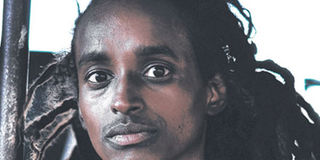Sudanese film maker brings reality of civil war to Toronto festival

Kuka, who directed the documentary, says he first set out to shoot a film that shows the desperate lives of the Nuba people who were living in constant danger from the skies, as an internal war raged in the southern part of Sudan. PHOTO| COURTESY
What you need to know:
- The 39th edition of the International Film Festival of Toronto in Canada, held on September 11-16, threw up a surprise when on the final day of the festival, a Sudanese documentary film, Beats of the Antonov, by Sudanese filmmaker Hajooj Kuka, won second place in the People’s Choice Documentary category.
- The title of the 65-minute film, shot in Arabic, is a play on words inspired by the sound of the Russian-made cargo planes used by government forces to bomb villages in the Nuba Mountains and the Blue Nile State.
- The filmmaker says that despite the film being in Arabic, he is certain that the people’s actions and their emotions articulate the narrative.
In a spectacular scene in the film, the planes are shown flying overhead and dropping bombs. People are shown running everywhere trying to escape in an expressive shot that tells the brutality of the war.
The 39th edition of the International Film Festival of Toronto in Canada, held on September 11-16, threw up a surprise when on the final day of the festival, a Sudanese documentary film, Beats of the Antonov, by Sudanese filmmaker Hajooj Kuka, won second place in the People’s Choice Documentary category.
The title of the 65-minute film, shot in Arabic, is a play on words inspired by the sound of the Russian-made cargo planes used by government forces to bomb villages in the Nuba Mountains and the Blue Nile State. The filmmaker says that despite the film being in Arabic, he is certain that the people’s actions and their emotions articulate the narrative.
Kuka, who directed the documentary, says he first set out to shoot a film that shows the desperate lives of the Nuba people who were living in constant danger from the skies, as an internal war raged in the southern part of Sudan.
However, at the end of the project, he says he realised that he had a film that showed the resilience of a people who despite the aerial bombardments, sang and danced in celebration of their way of life. Thus the beats of the Antonov.
Beats of the Antonov uses shocking realism to reflect the suffering of the Sudanese people in the war zones, and probably this more than anything else, won the hearts of the diverse voters at the film festival who awarded it the second prize in its category. The first prize was awarded to French rapper Abd Al Malik’s autobiographical May Allah Bless France.
Kuka’s win has, for the first time, put Sudan’s name on the screen of world cinema.
The Toronto film festival is widely considered to be start of the annual film awards season, serving as a high-profile launch pad for movies that have gone on to receive Oscar glory. Recently these were the likes of Slumdog Millionaire, The King’s Speech and 12 Years a Slave. There is every chance now that Kuka’s documentary will be among those vying for an Oscar in the documentary category come March next year.
The content
The documentary features real pictures of refugees of the Blue Nile and Nuba Mountains during the civil war in Sudan, telling their tragic stories through song and dance.
Kuka explains that the government bombing was allegedly aimed at destroying rebel positions but in the process ended up destroying homes, villages and the lives. Yet amid all this destruction, the Nuba people took the war in their stride and never lost their zest for life and danced and sang even as the Antonovs rained bombs on their land.
The bombings were supposed to cow them but they had the most unexpected result. “Sudanese farmers, herders and rebels of the Blue Nile and Nuba Mountain regions defiantly celebrates their heritage and tended their lands in the face of a government bombing campaign,” Kuka says.
“As the civil war ravaged Sudan, the civilian populations of these regions keep their spirits alive by celebrating life through song and dance,” he added.
“It is remarkable to witness such a commitment and sense of community that exists in the areas where poverty would be enough to cause one to give into despair,” the film maker notes.
Beats of the Antonov succeeds where other documentaries and narrative films about war and suffering on the African continent often fail, in that it finds a new, genuinely interesting angle from which to present a complex situation in a simple but emotional way,” is how Sudanese journalist Reem Showkat summed up the film.
This article was first published in The East African .




